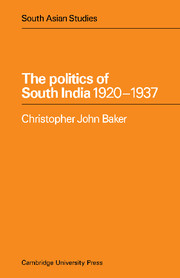Book contents
- Frontmatter
- Contents
- List of maps and tables
- Preface
- Notes on references, transliteration and abbreviations
- 1 Madras Presidency–natural features, regions and languages
- 2 Madras Presidency – districts
- 3 Madras Presidency – municipal towns
- 1 Politics and the Province: the Justice party
- 2 The province and the locality
- 3 Depression, dissent and disengagement
- 4 The ascent of the congress
- Conclusion
- Biographical notes
- Glossary
- Bibliography
- Index
1 - Politics and the Province: the Justice party
Published online by Cambridge University Press: 27 October 2009
- Frontmatter
- Contents
- List of maps and tables
- Preface
- Notes on references, transliteration and abbreviations
- 1 Madras Presidency–natural features, regions and languages
- 2 Madras Presidency – districts
- 3 Madras Presidency – municipal towns
- 1 Politics and the Province: the Justice party
- 2 The province and the locality
- 3 Depression, dissent and disengagement
- 4 The ascent of the congress
- Conclusion
- Biographical notes
- Glossary
- Bibliography
- Index
Summary
In December 1920, general elections in the provinces inaugurated a new constitution for the Government of India. It created a new all-India Legislative Assembly at Delhi and made other changes in the central Government, but it was in the provinces that it introduced the most important changes. In the Madras Presidency and in the other British provinces, the constitution laid down a scheme of ‘dyarchy’ or dual rule. For the next sixteen years the Governor in Council shared the responsibility for provincial government with three Indian ministers. The ministers were selected from among the members of a new Legislative Council and they were responsible to it. An electorate of over a million people selected most of the 123 members of the new legislature. In many ways, this constitution marked a big change in India's political history. Since 1861 there had been Legislative Councils in the provinces, but never one which was this large, which was directly elected, and which possessed such wide powers. There had never before been responsible Indian ministers. Although many Indian politicians loudly dismissed the new constitution as inadequate, others showed that they understood its importance. It provided opportunities for Indians to participate in the administration of the province. In particular, the new legislature provided for the first time an arena for provincial politics.
The reform of the constitution was one of the main features of a quinquennium which transformed politics in the Madras Presidency. Firstly, the Home Rule agitations of 1914–17 had thrust Madras into the forefront of all-India politics.
- Type
- Chapter
- Information
- The Politics of South India 1920–1937 , pp. 1 - 84Publisher: Cambridge University PressPrint publication year: 1976



